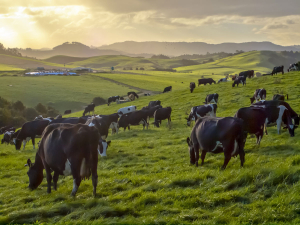State of the Dairy Nation 2024/25: DairyNZ Highlights Record Milk Production and Export Growth
DairyNZ's chief executive Campbell Parker says the 2024/25 dairy season reinforces the importance of the dairy sector to New Zealand.
 In the 2023/24 season, dairy companies processed 20.5 billion litres of milk containing 1.88 billion kgMS, which represented a 0.5% increase in kgMS.
In the 2023/24 season, dairy companies processed 20.5 billion litres of milk containing 1.88 billion kgMS, which represented a 0.5% increase in kgMS.
The dairy sector’s production remains stable despite tight and uncertain economic conditions, according to the latest annual New Zealand Dairy Statistics report.
In the 2023/24 season, dairy companies processed 20.5 billion litres of milk containing 1.88 billion kgMS, which represented a 0.5% increase in kgMS.
The report was published by DairyNZ and LIC.
DairyNZ chief executive Campbell Parker says that the dairy sector has undergone significant structural change in the last decade but throughout this period production levels have remained stable bringing much needed export revenue into the New Zealand economy.
“We have seen our dairy herd numbers reduce by 12% over the last decade, and a 5% decrease in total number of milking cows. Despite this, total milksolids processed have remained relatively stable, emphasising the resilience of our farmers, and their focus on ongoing productivity improvement,” says Parker.
“The increase in total milksolids production in the 2023/24 season was driven by a combination of the slight increase in cow numbers and favourable weather conditions.”
“Milksolids per cow are once again near record levels, which is a result of farmers dedication, technology uptake, and the application of science and insights driving better on-farm decisions and outcomes.”
Milksolids per cow increased to an average of 400 kgMS per cow, which is 6 kg higher than the five-year average of 394 kg milksolids per cow.
Cow numbers reached 4.7 million cows in 2023/24, slightly up from 4.67 million in the 2022/23 season, although still 2% below the five-year average of 4.80 million.
It can also be observed that until 2021 the average herd size had increased consistently, but in the past three years appears to have plateaued around a midpoint of 445 cows per herd.
The 2023/24 season saw a slight decrease in the percentage of cow’s herd tested on the previous season, at 77.1% (3.62 million cows), while artificial breeding remained relatively stable, with a slight decrease to 81.1% of cows (3.81 million cows).
LIC chief executive David Chin says that the slight decreases are not entirely unexpected, following a year of tight financial conditions on farm but emphasises the importance of utilising new technology and insights to improve sector production.
“The dairy sector is still producing more kilograms of milksolids per cow, which is a great result driven by farmers continued increased focus on improving cow productivity and farm efficiency. While there was a slight decrease in herd testing and artificial breeding uptake this year, it’s important to note that these practices remain critical to our sector’s success and as the economic outlook improves, we’re optimistic that these numbers will rebound in the coming season.
“This year’s Dairy Statistics once again highlight the growing preference for crossbreed genetics, which is delivering measurable benefits for dairy farmers, including a record-high average of 277 days in milk in 2023/24. This trend also supports the breeding of more profitable animals and reinforces LIC’s commitment to improving herd health and productivity through ongoing investment in genetics, diagnostics testing and farm software.”
The average dairy co-operative payout (including dividends) from Fonterra and Tatua was $8.90 for the 2023/24 season, an increase from $8.76 in the previous season. When adjusted for inflation, the 2023/24 payout was $0.35 below the five-year inflation-adjusted average of $9.25 per kg milksolids.
The 5+ A Day Charitable Trust has launched a collection of affordable recipes designed to turn everyday vegetables into seasonal stars.
Jane Mellsopp has been confirmed as the new Government Appointee to the New Zealand Meat Board (NZMB).
To celebrate the tenth anniversary of its annual Good Deeds competition, Rabobank will give away $100,000 to improve rural community hubs, schools, clubrooms, and marae across New Zealand.
Agricultural and veterinary product supplier Shoof International has appointed Michaela Dumper as its new chief executive.
Federated Farmers is celebrating following the Government's announcement that young farmers will be able to use their KiwiSaver funds to buy their first home or farm.
The Meat Industry Association of New Zealand (MIA) today announced that Chief Executive Officer Sirma Karapeeva has resigned from the role.
OPINION: Staying with politics, with less than nine months to go before the general elections, there’s confusion in the Labour…
OPINION: Winston Peters' tirade against the free trade deal stitched with India may not be all political posturing by the…